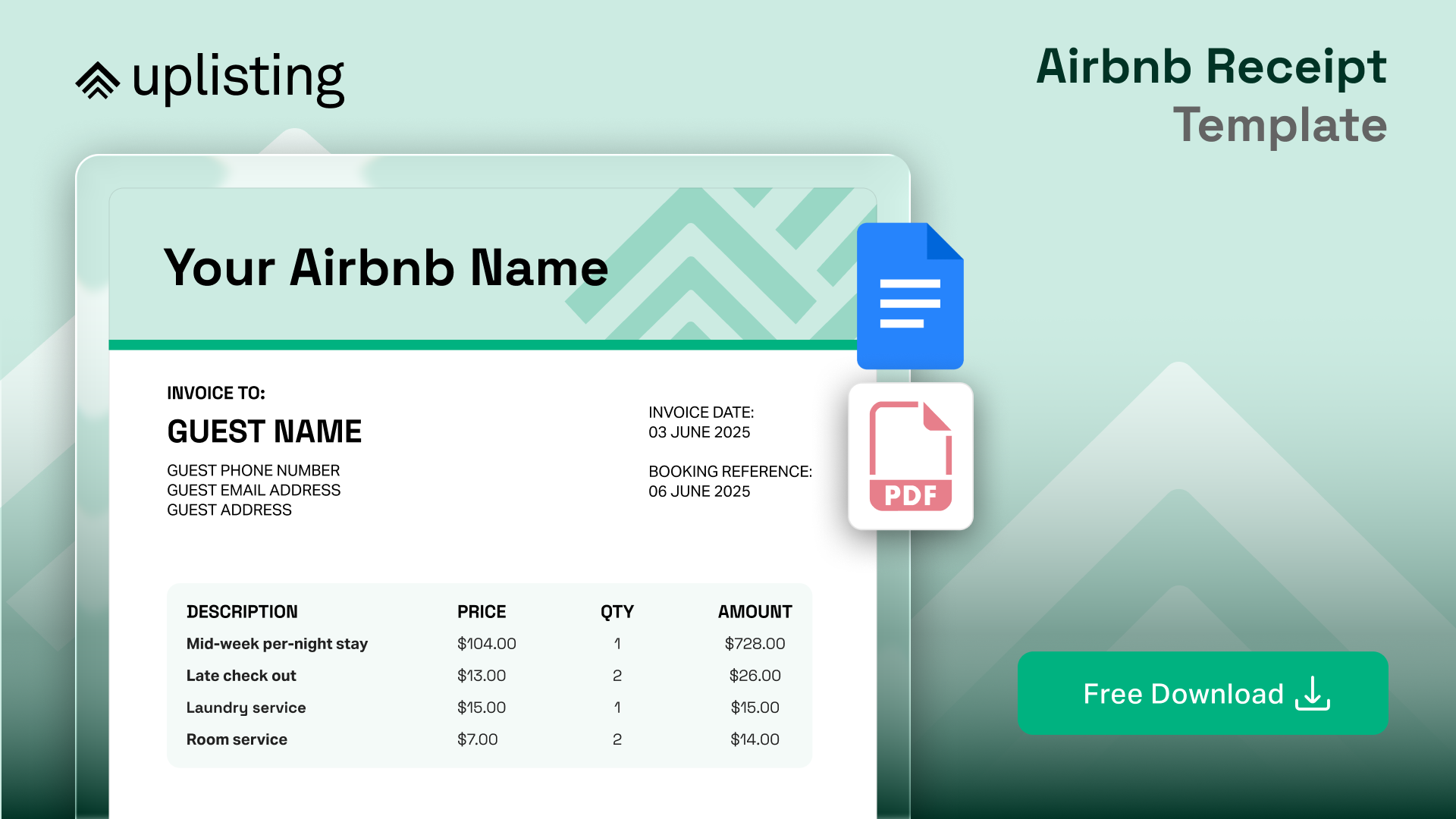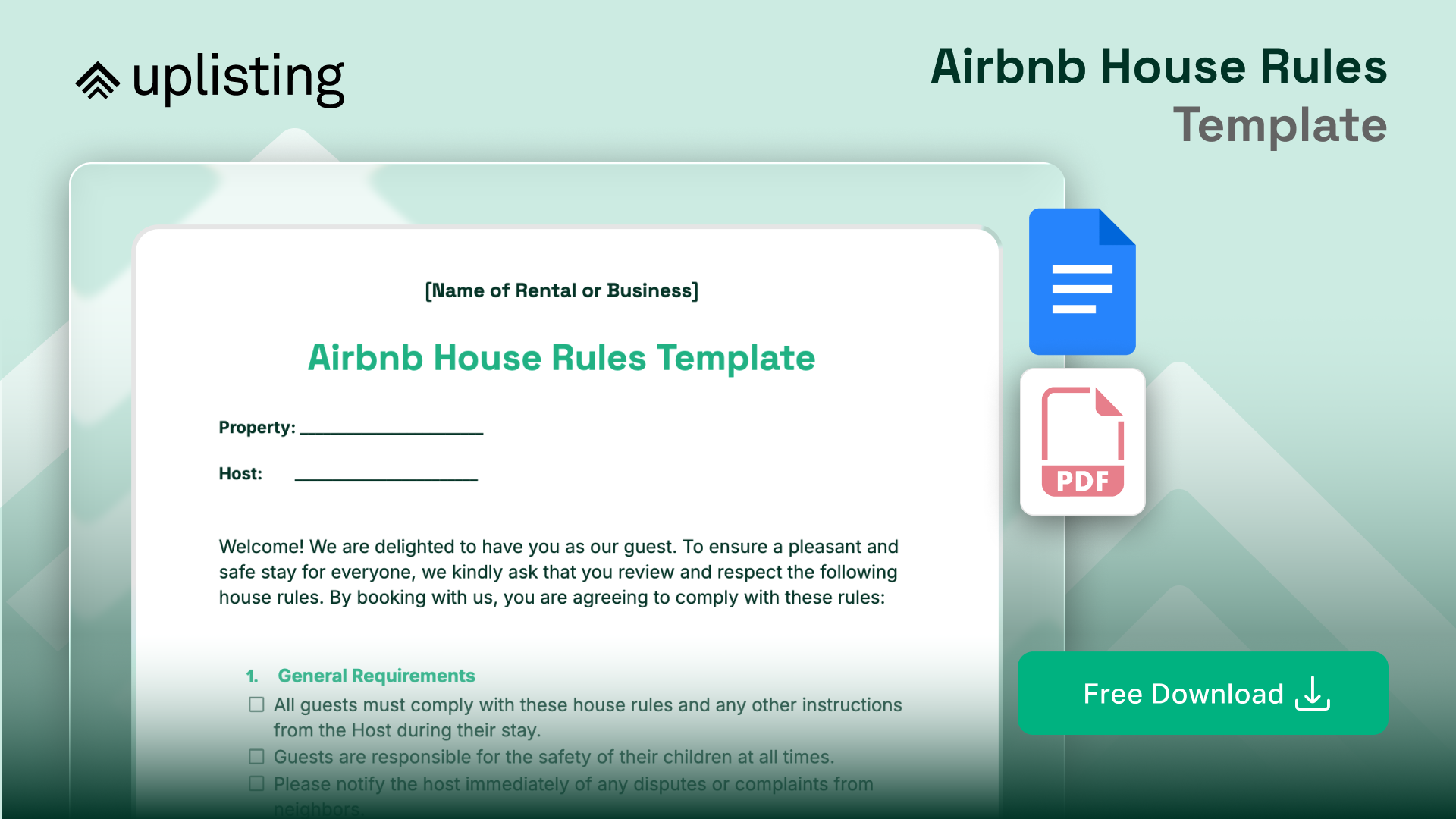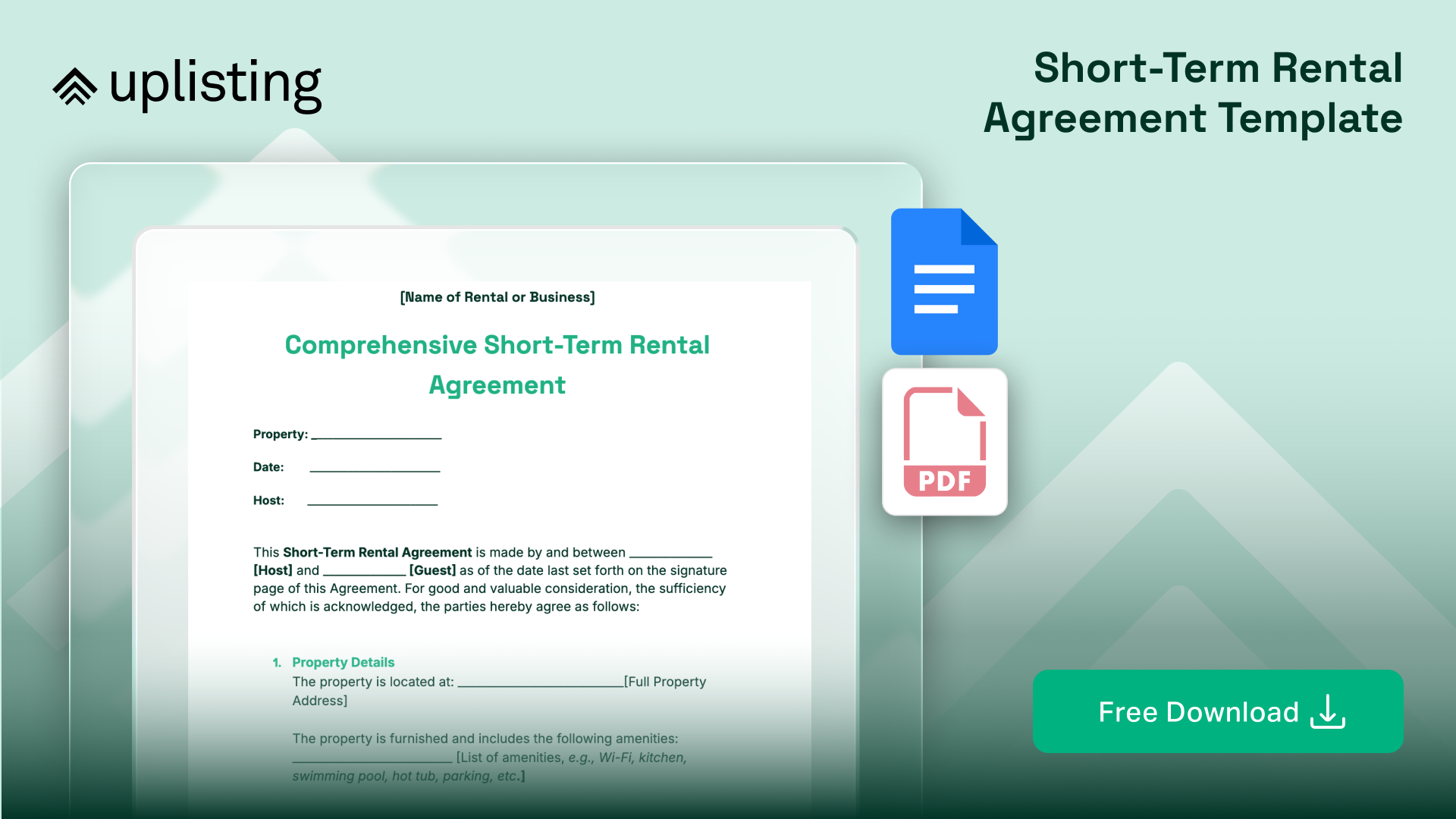Key Takeaways
Airbnb hosting can still be profitable, but success depends on your location, pricing strategy and management setup
Rising costs and competition mean hosts need to treat it like a real business—not a passive side hustle
Smart automation, multi-platform listings and data-driven pricing are key to staying ahead
If you're thinking about starting an Airbnb business in 2025, you'd be forgiven for thinking twice.
Manual tasks, unpredictable bookings, shifting legislation, and rising costs can make new short-term rental hosts question if the work is worth the reward. You’re juggling calendars, guest messages and turnovers—often with little insight into whether your property is actually performing better than others in your area. Not to mention that local government policy might make that attractive propoerty an investment dud.
Profitability feels possible, but it’s hard to tell what’s moving the needle and whether an Airbnb business is really worth it.
In this guide, we're breaking down what Airbnb business profitability looks like today, where most new hosts lose money and how the top performers are staying ahead. Whether you’re building your Airbnb business plan or just trying to gain back your evenings, the right systems can help you get more bookings with less stress.
What Profitability Looks Like in 2025
The bottom line is that profit is still on the table—but not for everyone.
Where you host, how you run your property, and what kind of stay you offer all shape whether your Airbnb business earns real income or just covers the bills. The gap between operators who treat hosting like a job and those who take a hands-off approach keeps getting wider.
Earnings swing hard from market to market. A two-bedroom in Phoenix might pull in $3,800 a month during high season, while a similar setup in Miami can clear $6,500. Even within the same neighborhood, performance depends on how well the space is designed, how quickly guests leave reviews, and how often the calendar gets updated. Passive income? Not anymore.
High-performing listings don’t leave revenue to chance
Top short-term rentals in 2025 have three things in common: a guest-first setup, consistently strong reviews, and smooth daily operations. Hosts who prioritize all three tend to book more nights and charge higher rates.
Guest-first setup: Clean lines, smart layout, fast Wi-Fi, and quality bedding go a long way. Guests notice—and they click.
Strong review flow: A five-star rating isn’t a nice-to-have anymore. It’s what keeps listings visible and bookable.
Tight operations: Automated messages, pricing tools, and calendar syncing aren’t upgrades. They’re standard gear for anyone serious about hitting revenue goals.
Treat your Airbnb like a real business
Profit now favors hosts who plan, track, and adjust. That means checking performance against nearby listings, knowing what expenses eat into revenue, and investing back into the space when needed. Guesswork doesn’t cut it.
Hands-off hosting rarely leads to strong margins. Structured systems, fast response times, and data-driven pricing help hosts stay competitive—especially in saturated markets. Online travel agencies now prioritize listings that deliver what guests want, so hosts who stay organized get bumped up in search results.
Running a short-term rental in 2025 means showing up like a business owner. Operators who do that aren’t just staying profitable... They’re growing.
All-in-one Vacation Rental Software and Channel Management System
Get started in seconds by connecting Airbnb
Manage short-term rentals & bookings, message guests, take payment, and so much more. All in one easy-to-use platform (that never double-books).
Factors That Impact Airbnb Profitability
Profit margins in short-term rentals change fast. Your location, operational setup, and how you compare to nearby listings all shape your bottom line. A well-designed property still won’t earn much if the numbers don’t make sense. If you're trying to grow an Airbnb business, knowing what affects earnings helps you make better decisions, faster.
Location and demand
Where the property sits is still the biggest driver of profit. Properties near downtown districts, coastlines, national parks, or year-round attractions usually pull in higher occupancy and better ADR (average daily rate). Proximity to stadiums, convention centers, or transit hubs also keeps calendars full.
Not every tourist destination turns a strong profit, though. Places with too many listings and limited demand often see weaker performance. Remote cabins or off-grid stays might look great in photos but can struggle outside of peak season. If the property sits in a quieter market, you’ll need sharper pricing, better amenities, and consistent five-star reviews just to keep pace.
Operating costs and taxes
Cleaning fees, repairs, restocking supplies, and inflated utility bills can pull revenue down fast. Contractors don’t come cheap, and linens don’t wash themselves. Hiring help—even part-time—means giving up a chunk of income every month.
Then there’s the paperwork. Many cities now require permits, safety inspections, or occupancy caps. Some expect hosts to collect and hand over short-term rental taxes. Airbnb also takes a cut from every booking. After all these line items, the payout often looks different than what the calendar shows. Hosts who run the numbers weekly stay ahead of surprise costs—and stay profitable longer.
Competition and platform saturation
More listings mean more pressure. When guests scroll through pages of properties in the same neighborhood, minor details make all the difference. Better photos, faster replies, and clearer house rules can shift bookings in your favor.
Even long-time hosts can lose visibility when Airbnb updates the search algorithm. A sudden drop in views, fewer inquiries, or a slip in review scores can push listings lower. Keeping up means treating the listing like a storefront—recent photos, accurate pricing, and guest questions answered within minutes, not hours. The hosts who stay visible are the ones who stay booked.
Running an Airbnb business isn’t about luck. It’s about staying sharp, tracking performance, and adjusting before things go off course.

Common Mistakes That Hurt Profitability
Profit margins often shrink not because the property is in a bad location or lacks style, but because daily operations aren’t tight. Small missteps—especially when repeated—can drain income faster than a slow season.
Pricing without using real numbers
Guessing rates based on what a neighbor charges or what feels fair usually backfires. Charging too little leaves earnings on the table. Charging too much results in an empty calendar. Either way, revenue suffers.
Successful hosts adjust rates based on what’s actually happening—local events, seasonality, booking pace, and what similar listings are charging. If a property books up quickly and consistently, rates are probably too low. If no one’s booking, it’s time to recalibrate. Pricing shouldn’t be static or based on gut feelings. It should shift based on what guests are willing to pay right now.
Skipping over guest feedback
Reviews aren’t just for show. They’re direct signals about what’s working and what’s not. When guests mention a noisy heater, confusing check-in, or slow internet—and nothing changes—future guests notice. Poor reviews don’t just ding your rating. They can drop a listing in search results, lower bookings, and hurt nightly rates.
The fastest way to recover from a bad review is to fix what’s reasonable and respond professionally. Hosts who listen closely, adapt quickly, and communicate clearly tend to stay booked even in tougher markets.
Running everything by hand
Manually sending check-in instructions, tracking cleanings with texts, and juggling multiple booking calendars becomes overwhelming fast. It also leads to mistakes—missed messages, double bookings, cleaners showing up late—all of which cost money and damage guest trust.
Without automation or a connected booking system, even a small portfolio turns chaotic. Automating guest messages, syncing calendars across platforms, and scheduling cleaners based on actual bookings saves hours each week and cuts down on errors. Time saved here can be spent improving guest experience or adding another property.
Profit doesn’t come from working harder. It comes from working smarter—and letting systems handle what doesn’t need your hands.
Save yourself from your inbox
Automate with Uplisting
Automated guest messages keep your guest informed from booking through to check-out. They’re designed to answer questions before they arise, saving you time whilst keeping your guests happy.
What Successful Hosts Are Doing Differently in 2025
The Airbnb business in 2025 rewards hosts who treat daily operations like a system, not a guessing game. Profit comes from structure, not luck. The difference between a profitable listing and one that struggles often comes down to how the host manages the boring stuff—calendar syncing, pricing, guest communication, and turnovers.
They automate the repeatable
Top hosts don’t send the same message twice. Automated workflows handle everything from booking confirmations to check-out reminders. Guests receive clear, timely information without hosts needing to touch a keyboard. Responses stay consistent, and nothing slips through the cracks.
Pricing updates happen in real time, based on demand, local events, and competitor trends. Hosts don’t try to calculate nightly rates manually—they let data do the heavy lifting so calendars stay full and revenue stays strong.
They list across multiple booking platforms
Relying on a single booking site leaves too much to chance. Successful operators spread listings across Airbnb, Vrbo, Booking.com, and their own direct booking sites. When one platform slows down or changes the rules, the others keep bookings steady.
Running a direct booking website adds more control and fewer fees. Repeat guests often prefer to book directly anyway, especially when the process feels simple and trustworthy. Hosts who build their own channels don’t depend entirely on someone else’s algorithm to stay visible.
They stop doing everything themselves
Hosts running profitable short-term rentals don’t answer late-night guest questions or coordinate last-minute cleans. They hire support and build routines others can follow. A cleaner gets notified as soon as a new booking lands. A guest support partner answers questions before the host even sees the inbox.
Freeing up time isn’t about doing less—it’s about focusing on the work that actually moves the business forward. Instead of juggling tasks, hosts can track performance, improve reviews, and plan for new properties.
Profit comes from running an Airbnb business like a real operation, not a side hustle that eats up every weekend.
You Can't Run an Airbnb Business Without Uplisting
Running an Airbnb business is still profitable in 2025—but only for hosts who treat it like a business, not a hobby. Profitability now depends on how well you manage operations, adapt to market conditions, and deliver consistently high-quality guest experiences.
The most successful hosts automate routine tasks, track performance with real data, and diversify their booking channels. By cutting inefficiencies and streamlining daily workflows, they stay competitive, keep calendars full, and grow revenue over time.
If you're ready to run a more profitable, scalable short-term rental business, it's time to simplify your systems and focus on what matters. Sign up for Uplisting to streamline your vacation rental management.
You’re in great company
Sign up
Some of the largest short-term rental operators (with 250+ properties) rely on Uplisting's software to scale their businesses.
FAQs
How much can I earn with an Airbnb property?
Earnings come down to four factors: location, property size, seasonality, and how you run the day-to-day. A one-bedroom near a busy downtown can bring in more than a three-bedroom in a quiet suburb—if the pricing and calendar are dialed in. Hosts who stay on top of demand trends, adjust rates often, and track expenses closely tend to earn more without adding more properties.
Is Airbnb still worth it with rising costs?
Yes, if you’re willing to stay sharp. Higher utility bills, taxes, and service fees are part of the picture now. But hosts who respond quickly to guest needs, price competitively, and keep reviews strong are still making solid returns. Profit now favors those who manage with intention, not guesswork.
Can I automate my Airbnb business?
You can—and you probably should. Guest messages, calendar syncing, pricing adjustments, and turnovers don’t need to be handled manually anymore. Once automation is in place, you spend less time fixing errors and more time growing the business. The goal isn’t to work harder; it’s to work less without dropping the ball.
Is it better to manage myself or hire a property manager?
The answer depends on your time and your goals. For 1 to 5 listings, running the show yourself makes sense, especially with the right tools handling the repetitive tasks. Hosts who automate messaging, cleanings, and pricing usually don’t need to hand off the operation—and they keep more of the profit in the process. Once the portfolio grows or hosting feels like a second job, bringing in help might be the right move.


















.png)

